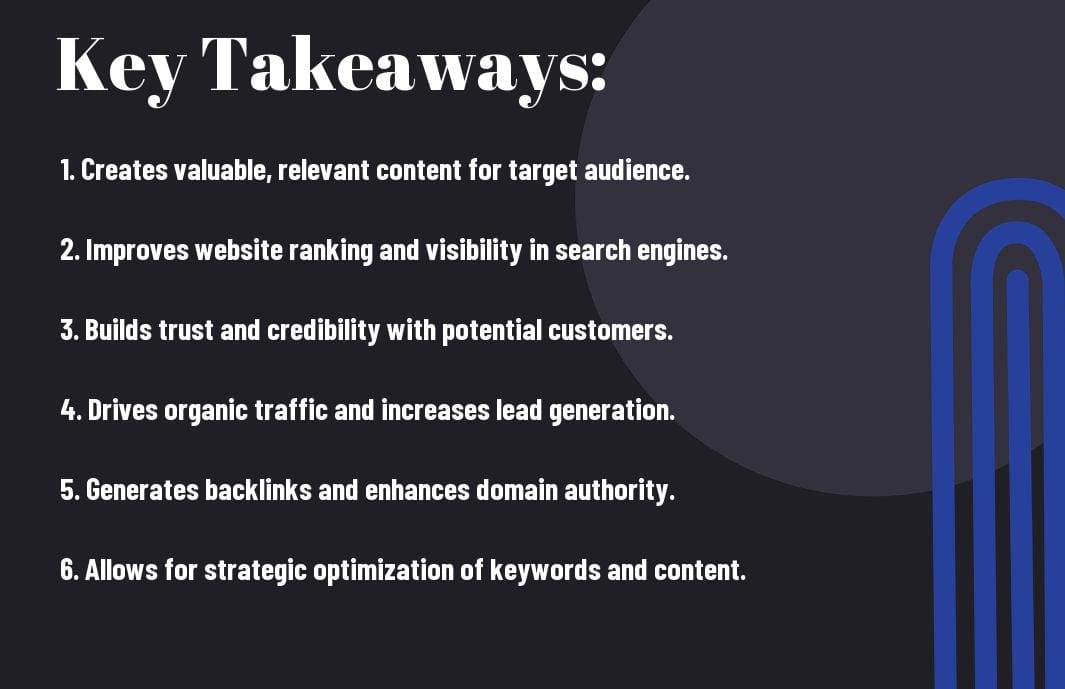Content plays a pivotal role in the success of SEO strategies. Quality content is not just king; it is the kingdom when it comes to boosting your website’s search engine ranking. Search engines love fresh, relevant, and authoritative content. Without a strong content marketing strategy, your SEO efforts may fall short, hindering your website’s visibility and ultimately, its performance.
Creating engaging and valuable content not only attracts visitors but also keeps them on your site longer, reducing bounce rates and improving overall user experience. This, coupled with strategic keyword integration, can significantly boost organic traffic and elevate your website’s search engine ranking. In today’s digital landscape, where competition for online visibility is fierce, a well-crafted content marketing strategy is necessary for any business looking to thrive and succeed in the ever-evolving world of SEO.
Key Takeaways:
- Content marketing is necessary for SEO: Content marketing plays a vital role in SEO strategies as search engines prioritize high-quality, relevant content when ranking websites.
- Quality content attracts organic traffic: By creating valuable and engaging content, websites can attract organic traffic, increase user engagement, and establish authority in their niche.
- Content marketing complements other SEO tactics: Content marketing complements other SEO tactics such as keyword research, link building, and on-page optimization, leading to a comprehensive and successful SEO strategy.

The Fundamentals of SEO
Overview of SEO Strategies
If you want your website to rank higher on search engine results pages (SERPs), a solid understanding of SEO strategies is crucial. SEO, or Search Engine Optimization, is the practice of optimizing your website to improve its visibility for relevant searches. This involves a combination of on-page and off-page tactics to ensure that search engines like Google can understand and index your content effectively. By implementing the right SEO strategies, you can drive organic traffic to your site, increase your online presence, and ultimately, boost your business.
The Role of High-Quality Content in SEO
On the journey towards mastering SEO, one factor stands out as a cornerstone of success – high-quality content. Content is not only king but also the foundation of any successful SEO strategy. Search engines prioritize websites that deliver valuable, relevant, and engaging content to their users. This means that creating compelling content that resonates with your audience is imperative for improving your search engine rankings. Without high-quality content, even the most technically optimized website may struggle to perform well in search results.
The significance of high-quality content in SEO cannot be overstated. It not only helps you attract organic traffic but also keeps visitors engaged and encourages them to explore other pages on your site. Furthermore, by regularly publishing fresh, relevant content, you signal to search engines that your website is active and authoritative in your industry. This can lead to improved rankings, increased visibility, and ultimately, higher conversion rates.
Keyword Integration in Content Marketing
Researching and Selecting Target Keywords
Targeting the right keywords is the foundation of successful SEO and content marketing strategies. To begin, conduct thorough research to identify the keywords that are relevant to your business and have high search volumes. Utilize tools such as Google Keyword Planner, SEMrush, and Moz Keyword Explorer to gather valuable insights into search trends and competition level for each keyword.
Once you have a list of potential keywords, analyze their relevance to your content and target audience. Select keywords that align closely with your brand and website content while also considering user intent. By choosing the right keywords, you can improve your chances of ranking higher in search engine results pages and attracting quality traffic to your site.
Strategic Placement of Keywords
One of the key aspects of effective keyword integration is the strategic placement of keywords within your content. Keywords should be naturally incorporated into your content, including the title, headings, meta descriptions, and body text. By strategically placing keywords in key areas of your content, you can signal to search engines the relevance of your content to users’ search queries.
Moreover, avoid keyword stuffing, as this can negatively impact your SEO efforts. Instead, focus on creating high-quality, engaging content that provides value to your audience while intelligently integrating your target keywords. Note, the goal is to enhance user experience and organic visibility, so prioritize the strategic placement of keywords throughout your content.
User Experience and Content Engagement
Creating Valuable and Relevant Content
Your content is the backbone of your SEO strategy. When creating content, it is crucial to focus on providing valuable and relevant information to your audience. This not only helps in engaging users but also keeps them coming back for more. By understanding your target audience and their needs, you can tailor your content to address their questions, concerns, and interests.
Impact of User Engagement on SEO Rankings
Content that sparks user engagement is favored by search engines because it indicates that your content is relevant and useful to the audience. The time users spend on your site, the pages they visit, and the actions they take all contribute to your SEO rankings. Search engines recognize user engagement as a signal of a positive user experience, and as a result, reward websites with higher rankings.
User engagement metrics such as bounce rate, time on page, and social shares play a significant role in determining how well your content is resonating with your audience. By analyzing these metrics, you can gain valuable insights into the effectiveness of your content and make data-driven decisions to enhance your SEO strategy.
Building Authority with Quality Content
How Content Establishes Subject Matter Expertise
Not all content is created equal when it comes to establishing authority in your industry. To position your brand as a subject matter expert, it is important to consistently deliver high-quality, valuable content to your audience. This content should demonstrate your deep understanding of the industry, provide insights that solve problems or address common pain points, and showcase your unique perspective that sets you apart from competitors.
The Importance of Trustworthiness in SEO
The foundation of a successful SEO strategy lies in building trust with both search engines and your target audience. The key to achieving this trust is through creating content that is not only informative and engaging but also trustworthy. Search engines like Google prioritize websites that are perceived as reliable sources of information, and earning this trust can significantly boost your search rankings and visibility online.
Subject matter expertise and trustworthiness go hand in hand in the world of SEO. By consistently producing high-quality, trustworthy content that demonstrates your expertise in the field, you can establish your brand as a go-to resource for both search engines and users. This approach not only improves your SEO performance but also enhances your credibility and authority in the industry, leading to long-term success.
Link Building Through Content Marketing
After reading about Content Marketing & SEO: A Dynamic Duo, it is evident that link building plays a crucial role in SEO strategies. One effective way of earning backlinks is by creating informative and valuable content that other websites or blogs would want to link back to. When your content is seen as a valuable resource, other websites are more likely to reference it, thus generating natural backlinks to your site.
Earning Backlinks with Informative Content
Link building through content marketing involves producing content that is informative, relevant, and engaging. By creating content that addresses common questions or provides solutions to problems within your industry, you can attract backlinks from authoritative websites looking to share valuable resources with their audience. This not only improves your site’s credibility but also boosts its visibility in search engine results.
Guest Blogging and Content Syndication Strategies
Through guest blogging and content syndication, you can further expand your reach and build quality backlinks to your site. Guest blogging involves writing content for other websites in your niche, with a byline that includes a link back to your site. Content syndication, on the other hand, involves republishing your content on various platforms to reach a wider audience and attract backlinks from different sources.
Informative content that provides value to readers is key to the success of guest blogging and content syndication strategies. By offering unique insights, actionable tips, or industry expertise, you can establish yourself as an authority in your field and attract more backlinks from reputable websites.
Content Marketing and Social Signals
Enhancing Social Media Presence Through Content
To establish a strong online presence in today’s digital landscape, businesses must leverage content marketing to enhance their social media presence. By creating high-quality, relevant, and engaging content, brands can attract and engage their target audience on platforms like Facebook, Instagram, Twitter, and LinkedIn. Through strategically crafted content, businesses can build credibility, trust, and loyalty among their followers, ultimately driving more traffic to their website and increasing conversion rates.
Pertaining to content marketing, consistency is key. By regularly publishing valuable content that resonates with your audience, you can maintain an active presence on social media platforms and stay top of mind with your followers. This continuous engagement not only strengthens your brand’s reputation but also encourages social sharing, expanding your reach and increasing brand visibility.
The Correlation Between Social Signals and SEO
An increasing number of marketers are recognizing the importance of social signals in contributing to a website’s search engine optimization (SEO) performance. Social signals refer to the metrics that indicate how users engage with your content on social media platforms. These signals can include likes, shares, comments, and overall social media visibility. Search engines like Google consider these social signals as indicators of a website’s credibility, authority, and relevance, which can positively impact its search ranking.
To enhance your SEO efforts through social signals, it is vital to create compelling and shareable content that resonates with your audience. By encouraging social sharing and engagement, you can signal to search engines that your content is valuable and worthy of higher rankings. Additionally, integrating social sharing buttons on your website and optimizing your content for social media platforms can further boost your social signals and SEO performance.
Measuring the Success of Content Marketing in SEO
Now, in order to determine the effectiveness of content marketing within SEO strategies, it is crucial to accurately measure its success. This involves analyzing key performance indicators (KPIs) that reflect the impact of content marketing efforts on search engine rankings and overall organic traffic.
Key Performance Indicators (KPIs) for Content Marketing
Marketing professionals track a variety of KPIs to assess the performance of content marketing in SEO. These may include metrics such as organic traffic growth, keyword rankings, backlink acquisition, conversion rates, and engagement on the website or through social media channels. By monitoring these KPIs over time, marketers can gain insights into the effectiveness of their content marketing efforts and make data-driven decisions to optimize their strategies.
Tools for Tracking and Analyzing SEO Performance
One necessary aspect of measuring the success of content marketing in SEO is the use of tools for tracking and analyzing performance. There are numerous tools available that provide in-depth insights into website traffic, keyword performance, backlink profiles, and overall SEO health. These tools help marketers identify areas for improvement, uncover new opportunities, and benchmark their performance against competitors in the industry.
Analyzing data from these tools is necessary for refining content strategies, optimizing website performance, and ultimately enhancing search engine visibility. By leveraging the power of data-driven insights, marketers can make informed decisions to achieve sustainable growth and maximize the impact of content marketing on SEO.
Adapting Content Strategy for Voice Search and Mobile
Optimizing for Voice Search SEO
All search trends indicate a significant increase in the use of voice search in recent years. As more and more people rely on virtual assistants like Siri, Alexa, and Google Assistant to find information, it’s crucial for content marketers to optimize their strategies for voice search SEO. Voice searches tend to be longer and more conversational compared to text searches, so incorporating long-tail keywords and natural language into your content is key. Additionally, providing direct answers to common questions can help improve your chances of being featured in voice search results.
Mobile-First Content Strategy
Optimizing your content for mobile devices is no longer optional—it’s a necessity. With the majority of internet users accessing content from their smartphones and tablets, having a mobile-first content strategy is necessary for successful SEO. This means ensuring that your website is mobile-responsive, with fast loading times and easy navigation. Google’s mobile-first indexing prioritizes mobile-friendly websites, so optimizing your content for mobile not only improves user experience but also boosts your search engine rankings.
Understanding the shift towards voice search and mobile browsing is crucial for staying ahead in SEO. By adapting your content strategy to cater to these trends, you can enhance your online visibility and attract more organic traffic to your website. Incorporating voice search optimization techniques and embracing a mobile-first approach will not only improve your SEO performance but also future-proof your website in the constantly evolving digital landscape.
Content Marketing Trends and SEO
Despite the ever-changing landscape of digital marketing, one thing remains constant: the importance of content marketing in successful SEO strategies. Understanding and leveraging the latest trends in content marketing can significantly impact your website’s visibility and ranking on search engine results pages.
The Rise of Video Content and Visual Storytelling
An increasing trend in content marketing is the rise of video content and visual storytelling. Audiences are consuming more video content than ever before, making it a powerful tool for engaging with your target audience. Visual storytelling through videos allows brands to connect with their audience on an emotional level, driving more significant impact and engagement. Incorporating video content into your content marketing strategy can enhance your SEO efforts by increasing user engagement, time spent on site, and social shares, all of which are important ranking factors for search engines.
Adapting to Algorithm Changes and Evolving SEO Practices
An important aspect of a successful SEO strategy is adapting to algorithm changes and evolving SEO practices. Search engines like Google frequently update their algorithms to provide users with more relevant and high-quality search results. Staying informed about these changes and adjusting your SEO tactics accordingly is crucial for maintaining and improving your website’s search visibility. Failure to adapt to algorithm changes can result in a significant drop in your rankings, leading to decreased organic traffic and visibility.
The key to staying ahead in the ever-evolving SEO landscape is to focus on creating high-quality, relevant content that aligns with the latest SEO best practices. Regularly monitoring your website’s performance, optimizing for mobile users, and improving site speed are all important components of adapting to algorithm changes and evolving SEO practices.
Conclusion
On the whole, content marketing plays a crucial role in successful SEO strategies due to its ability to improve website visibility, engage audiences, and build credibility with search engines. By creating high-quality and relevant content, businesses can attract organic traffic, generate backlinks, and establish themselves as industry leaders in the digital landscape. Content marketing allows companies to address the needs and interests of their target audience while incorporating relevant keywords to enhance their search engine rankings.
In essence, content marketing serves as the foundation of effective SEO strategies, providing a sustainable and long-term approach to driving traffic and achieving online success. By consistently producing valuable content that resonates with users and meets search engine criteria, businesses can establish a strong online presence, increase their visibility, and ultimately drive conversions. As search engines continue to prioritize quality content, businesses that prioritize content marketing will undoubtedly reap the benefits of improved SEO performance and sustainable growth in the digital realm.
FAQ
Q: Why is content marketing important for SEO?
A: Content marketing is important for SEO because search engines prioritize high-quality, relevant content when ranking websites. By creating valuable content, you can improve your website’s visibility and organic search rankings.
Q: How does content marketing impact SEO strategies?
A: Content marketing plays a crucial role in SEO strategies by helping websites attract more organic traffic, earn backlinks, and establish authority in their industry. It also provides opportunities to target specific keywords and improve user engagement.
Q: What types of content are effective for SEO purposes?
A: Various types of content can be effective for SEO, including blog posts, articles, infographics, videos, podcasts, and case studies. The key is to create content that is valuable, informative, and relevant to your target audience.
Q: How can content marketing improve website rankings?
A: Content marketing can improve website rankings by attracting quality backlinks from other websites, increasing user engagement metrics such as time on page and bounce rate, and targeting relevant keywords that align with user search intent.
Q: What role does keyword research play in content marketing for SEO?
A: Keyword research is important in content marketing for SEO as it helps identify the terms and phrases that your target audience is searching for. By incorporating these keywords strategically into your content, you can improve your website’s visibility in search engine results.
Q: How can content marketing help build brand credibility and trust?
A: Content marketing allows brands to demonstrate their expertise, authority, and trustworthiness in their industry. By consistently delivering valuable content that addresses the needs and interests of their audience, brands can build credibility and trust over time.
Q: What are some best practices for integrating content marketing into SEO strategies?
A: Some best practices for integrating content marketing into SEO strategies include conducting keyword research, creating high-quality and relevant content, optimizing meta tags and headings, promoting content through social media and email marketing, and monitoring performance metrics to make data-driven decisions.




